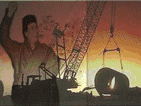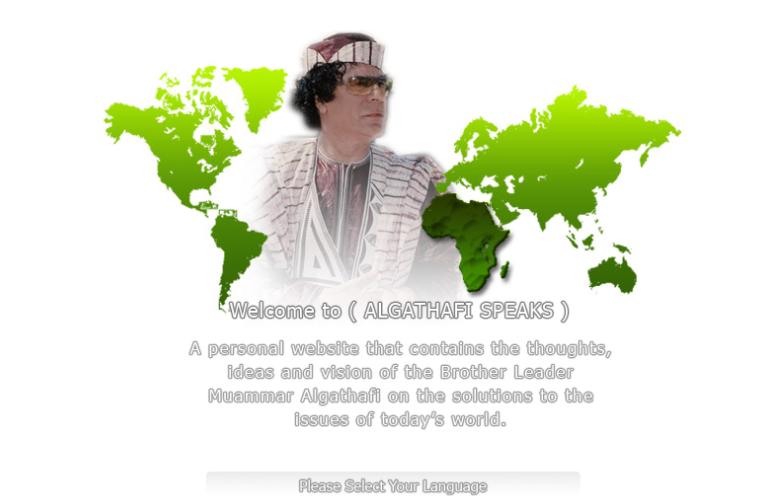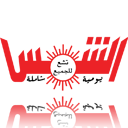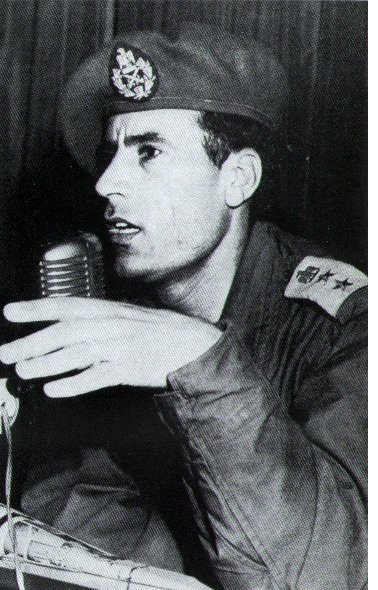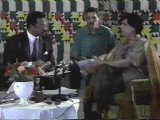JJ: So
your point is that you would be willing to release them, indeed,
release them to me --
MQ: To you, OK.
Not to America or to the British, to you.
JJ: So to any
place other than the U.S. or Britain, you would encourage their
release.
MQ: No
objection. We must do this and solve this problem and normalize our
relations and go forward with the future.
JJ: Your people
took us on a tour of your home which was bombed in 1986 -- an air
raid in which more than 200 people were killed. Indeed your own
two-year-old daughter died in that bombing attack. And there is a
great sense of pain throughout Libya about what happened at 2
o'clock AM on that morning in 1986. Was PanAm 103 your
revenge?
MQ: I don't
think so, but we have to get these two accused people to the court
to know the truth. It is important for us to know the
truth.
JJ: Do you
believe, given all the accusations, that Libyans were involved in
this act?
MQ: I don't
think so because it is far from Libya. It is a plane that came from
the Far East, through Frankfurt, and crashed on Lockerbie. What is
the relation of this accident to Libya? The flight was not from
Libya, no Libyan luggage, no Libyan passenger, what is the relation
of Libya with this tragic accident? We heard about it in the media,
like any other viewer.
JJ: So you are
saying: to you it was not an act of revenge, not that of any of the
Libyan officials.
MQ: Of course,
of course! I told you, we heard about this accident through the
media like any other one heard about it, and we were very sorry
that night when we heard about this disaster.
JJ: There are
real concerns, of course, about the plane that you have addressed
in this interview so far. The issue about Libya's strategic role in
the world -- are you willing to lead some new, bold initiatives to
change how people view Libya in the world?
MQ: I think if
these two people release themselves to you, for example, and a
trial takes place for them [in order] to know the truth about this
disaster, and we finish all this hostile climate and atmosphere
between the West and East, between Libya and America particularly,
and we exchange visits and we meet together --
JJ: Exchange
visits?
MQ: Yes,
between Libya and America, between Clinton and me -- to meet
together in America, or in Libya, or in any other place -- it will
be a big change.
JJ: So you feel
that by encouraging the release of these two suspects and having
that trial, that represents a bold step in a new direction, and you
would be assertive in leading that --
MQ: Yes, of
course. And, for me, I am ready to go to America --
JJ: It sounds
like Qadhafi going on the offense.
MQ: OK -- to
solve this problem and to change the world for the
better!
JJ: There's a
peace process under way now that includes Egypt and Israel and
Syria and Jordan and the like -- do you support that
process?
MQ: If it is
the way of peace, we support it. But if it is a waste of time, that
is another matter. I don't think it is the best way to achieve
peace in the Middle East. To achieve peace in the Middle East, we
must solve the problem of Palestine radically and historically and
finally -- to let the Palestinian people come back to Palestine,
and to create a new, democratic state in Palestine for Israelis and
Palestinians, like what is going on in South Africa: free elections
under the supervision of the United Nations, all blacks and whites
together. Palestinians and Israelis together, voting in a free
election under the supervision of the UN and to create a democratic
country: it is the historical and ethical solution.
JJ: Back to
Libya and your own determination to come out of isolation. One of
the accusations levelled at Libya is that you still have terrorist
camps inside the country, training people from other countries to
engage in warfare. Are there any such camps in Libya
today?
MQ: First of
all, these camps are not terrorist camps. And they finished now,
although they are not terrorist camps. These camps were the camps
of SWAPO and SWAPO now is an independent country --
JJ: Namibia
--
MQ: Sam Nujoma
-- is he a terrorist? No! Then what do they mean his camps in Libya
were terrorist camps? The camps of President Museveni of Uganda,
they finished because he won the war, and he now is the president.
Is he a terrorist? No! The camps of Zimbabwe, of Mugabe, the forces
of Mugabe were here --
JJ: There are
no more such camps?
MQ: Of course
not! There are no camps now.
JJ: Would you
allow the UN to inspect them to satisfy themselves that
--
MQ: Yes, yes!
We have many times invited the UN to send an international
committee from [the] UN to inspect and to see these camps. It is
very important for us, and we challenge them: we challenge them to
come here and to see these camps.
JJ: What about
the question of Libya making chemical weapons?
MQ: We want the
United Nations to form an international committee to inspect all
the area, including Libya.
JJ: So if the
UN formed a committee and came to Libya --
MQ: Not only
Libya. All the area. To see where these weapons are and to destroy
[them].
JJ: So you are
saying, if they were to come to Libya and find such a manufacturing
apparatus for chemical warfare, they could destroy it?
MQ: Yes, if
they come to the area, to inspect all the area: Israelis, Libyans,
Egypt, any other countries in the area.
JJ: [What do
you think of] U.S. President Bill Clinton?
MQ: I described
him as a bright star coming from the darkness of the middle of the
Western Hemisphere. He is good, really, a good man, very acute -- a
good man, and no complexes.
JJ: What do you
think of Libya's maximum leader, Mu`ammar Qadhafi?
MQ: [Begins to
answer in Arabic]
JJ: Talk to me
in English now ...
MQ: [laughing]
In English? Describe myself in English?
JJ:
Yes.
MQ: Qadhafi is
a man who -- The ordinary citizens like him, and he wants to live
for them. But the centers of power in the world are against him.
His picture has two sides, his image, -- a good one and a distorted
one.
JJ: So there's
a clear picture of Qadhafi, and there's a distorted picture. Thank
you tonight for sharing your thoughts.
CLOSING
THOUGHTS from Rev. Jackson: Final thoughts from Tripoli. Col.
Qadhafi clearly wants the sanctions off. He wants to get PanAm103
behind him. He says 'Take these two Libyans to a court anywhere in
the world except Britain or the U.S.' Will the Clinton
Administration buy into this? We really do not know. Here in
Tripoli, they hope he says 'Yes'.
(This is an
unofficial transcript. Any errors it may contain are my personal
responsibility, and I apologize for them. -- I.S.))

Posted 01sh September
1993
]
